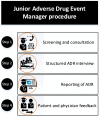Medical students as junior adverse drug event managers facilitating reporting of ADRs
- PMID: 33955031
- PMCID: PMC9291906
- DOI: 10.1111/bcp.14885
Medical students as junior adverse drug event managers facilitating reporting of ADRs
Abstract
The Junior Adverse Drug Event Manager (J-ADEM) team is a multifaceted intervention focusing on real-life education for medical students that has been shown to assist healthcare professionals in managing and reporting suspected adverse drug reactions (ADRs) to the Netherlands Pharmacovigilance Centre Lareb. The aim of this study was to quantify and describe the ADRs reported by the J-ADEM team and to determine the clinical potential of this approach. The J-ADEM team consisted of medical students tasked with managing and reporting ADRs in hospitalized patients. All ADRs screened and reported by J-ADEM team were recorded anonymously, and categorized and analysed descriptively. From August 2018 through January 2020, 209 patients on two wards in an academic hospital were screened for ADR events. The J-ADEM team reported 101 ADRs. Although most ADRs (67%) were first identified by healthcare professionals and then reported by the J-ADEM team, the team also reported an additional 33 not previously identified serious ADRs. In 10% of all reported ADRs, the J-ADEM team helped optimize ADR treatment. The ADR reports were largely well-documented (78%), and ADRs were classified as type A (66%), had a moderate or severe severity (85%) and were predominantly avoidable reactions (69%). This study shows that medical students are able to screen patients for ADRs, can identify previously undetected ADRs and can help optimize ADR management. They significantly increased (by 300%) the number of ADR reports submitted, showing that the J-ADEM team can make a valuable clinical contribution to hospital care.
Keywords: medical education; pharmacotherapy; pharmacovigilance; reporting ADRs.
© 2021 The Authors. British Journal of Clinical Pharmacology published by John Wiley & Sons Ltd on behalf of British Pharmacological Society.
Conflict of interest statement
There are no competing interests to declare.
Figures

References
-
- Roulet L, Asseray N, Dary M, Chiffoleau A, Potel G, Ballereau F. Implementing a clinical pharmacy survey of adverse drug events in a French emergency department. Int J Clin Pharmacol. 2012;34(6):902‐910. - PubMed
-
- Budnitz DS, Pollock DA, Weidenbach KN, Mendelsohn AB, Schroeder TJ, Annest JL. National surveillance of emergency department visits for outpatient adverse drug events. JAMA. 2006;296(15):1858‐1866. - PubMed
-
- Hazell L, Shakir SA. Under‐reporting of adverse drug reactions: a systematic review. Drug Saf. 2006;29(5):385‐396. - PubMed
MeSH terms
LinkOut - more resources
Full Text Sources
Other Literature Sources
Medical
Research Materials

